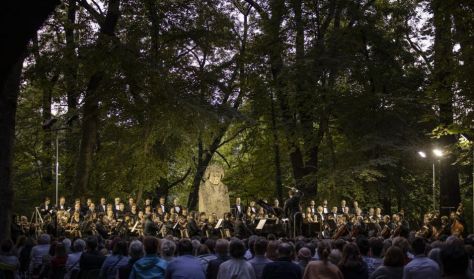
Concerts of the National Philharmonic in Martonvásár
BEETHOVEN IN THE PARK - M A R T O N V Á S Á R - SUMMER 2021
The Hungarian National Philharmonic's Beethoven Concerts
at the Park of the Centre for Agricultural Research

BEETHOVEN IN THE PARK - M A R T O N V Á S Á R - SUMMER 2021
The Hungarian National Philharmonic's Beethoven Concerts
at the Park of the Centre for Agricultural Research
Ön egy múltbeli eseményre keresett rá. Kérjük, válogasson aktuális kínálatunkból a Jegy.hu keresőjében!
Last event date: Saturday, July 17 2021 7:00PM
Saturday, 3 July
(rain date: 4 July)
Beethoven: Symphony No. 1 in C major, op. 21
Beethoven: Symphony No. 3 in E-flat major ("Eroica"), op. 55
Conductor: RÓBERT FARKAS
With his Symphony No.1, Beethoven was still following in the footsteps of his predecessors: the proportions of this work correspond to those of Hadyn's late-career London Symphonies. This joyful, energetic and witty piece was composed across two centuries, the 18th and 19th, and was fittingly completed by the Bonn-born maestro in 1800. Symphony No.3 ("Eroica"), was composed in 1803/04 and first performed in 1805. This piece, however, was a huge leap towards a more Romantic approach and was characterised by a weightier symphonic sound, more theatrical gestures and the appearance of the authentic, Romantic-inspired hero-worship that was so integral to much of Beethoven's work. Beethoven had originally planned to dedicate the piece to Napoleon, but when he found out that the First Consul had crowned himself emperor, he furiously ripped up the dedication, and the piece was instead given the title Sinfonia eroica.
Born in Ózd in Hungary, Róbert Farkas won 3rd prize at the 2011 Lovro von Matačić International Competition of Young Conductors. After graduating from the Liszt Academy in Budapest, he studied at the Universität der Künste in Berlin from 2006 to 2012. Since that time, all of his greatest achievements have been tied to Germany.
Saturday, 17 July
(rain date: 18 July)
Beethoven: King Stephen Overture, op. 117
Beethoven: Symphony No. 9 in D minor, op. 125
Featuring: Hungarian National Choir (choirmaster: Csaba Somos)
Eszter Sümegi – soprano
Atala Schöck – alto
Tibor Szappanos – tenor
Krisztián Cser – bass
Conductor: GERGELY VAJDA
Hungarian music lovers always take pleasure in listening to Beethoven's King Stephen Overture (1811). This is not only because the incidental music written for a Kotzebue play – the overture constituted the opening movement – was composed by Beethoven for the inauguration of the German Theatre of Pest, but also because the composer paid tribute to his "mustachioed Hungarian friends" with the piece's noble verbunkos melodies. Symphony No. 9 (1824), Beethoven’s last completed symphony, is a major work of Western culture, on a par with Bach’s St. Matthew Passion or Mozart’s The Magic Flute, in that in addition to
its aesthetic value, it also helped define timeless moral standards. The finale, which employs both choir and soloists, combines the genres of oratorio and symphony. Beethoven's setting of Schiller's Ode to Joy to music is a paean to not only joy itself, but also to love and liberty.
The career of conductor, composer and clarinetist Gergely Vajda (b.1973) developed in the United States as the head of the Milwaukee, Oregon and Huntswille symphony orchestras, though the artist has always remained in constant and close contact with Hungarian music.
10 July, Saturday
(rain date: 11 July)
Beethoven: Symphony No. 5 in C minor ("Fate"), op. 67
Beethoven: Symphony No. 7 in A major, op. 92
Conductor: GERGELY MADARAS
Beethoven's Symphony No.5 in C minor ("Fate"), written in 1808, is one of the most played, most popular and most-cited works in the history of music. Its name did not come from the composer himself, however. Beethoven’s secretary, Anton Schindler – not always a reliable source – left an anecdote for posterity claiming that in relation to the piece's famous four-voiced opening motif, the composer commented that “this is the sound of fate knocking at the door”.
There is no doubt that Beethoven continued the focus on hero-worship already present in his Symphony No.3, and we can see the heroic story as a struggle with fate and a triumph over it. The thematic unity anticipates the symphonic poems of Liszt. Symphony No. 7 (1812) sings a tale of Dionysian intoxication, while its central musical elements are made from (mostly dactyl) rhythm, dance and movement. It is no surprise that Wagner called the piece "the apotheosis of dance".
Gergely Madaras (1984) is the music director of the Orchestre Philharmonique Royal de Liège, a regular guest performer at several European and international concert halls and opera houses, and has displayed his talents as the conductor of the English National Opera, the Savaria Symphony Orchestra and the Dijon Bourgogne Orchestra.
Az ország egyik legnagyobb poplegendája, Geszti Péter és zenekara 2025. augusztus 1-jén a Tokaj Fesztiválkatlan színpadán lép fel.
Egyszerre politikai dráma, krimi és szerelmi história, amely a 15. század közepének izgalmas történelmi eseményeit eleveníti meg, bemutatva a Hunyadi család felemelkedését.
The spectacular tournament of infantrymen and mounted knights - together with Italian flag-throwing show, archers’ show, medieval dance and falconry shows, as well as jousting - is held at the original tournament field of the royal palace with amazing performances featuring outstanding international participants, among others Lajos Kassai, the world-famous horseback archer. Come and be part of this real one-of-a-kind event which presents you and your family a very special blend of history, spectacle and fun!
"Mindig valami bajba kerülnek, mindig történik velük valami hihetetlen, kiszámíthatatlan, és mindig elrontják valahogy.”- vélekedik Mona, Alex és Simon párosáról…
Dumaszínház est
Három „istencsászár” férfi közös lakást bérel, ahol vad és boldog agglegény életüket élik, állandóan változó barátnők társaságában. E jól működő…
item(s) in basket
total:
Time limit has expired. Please, put item(s) in to basket again.